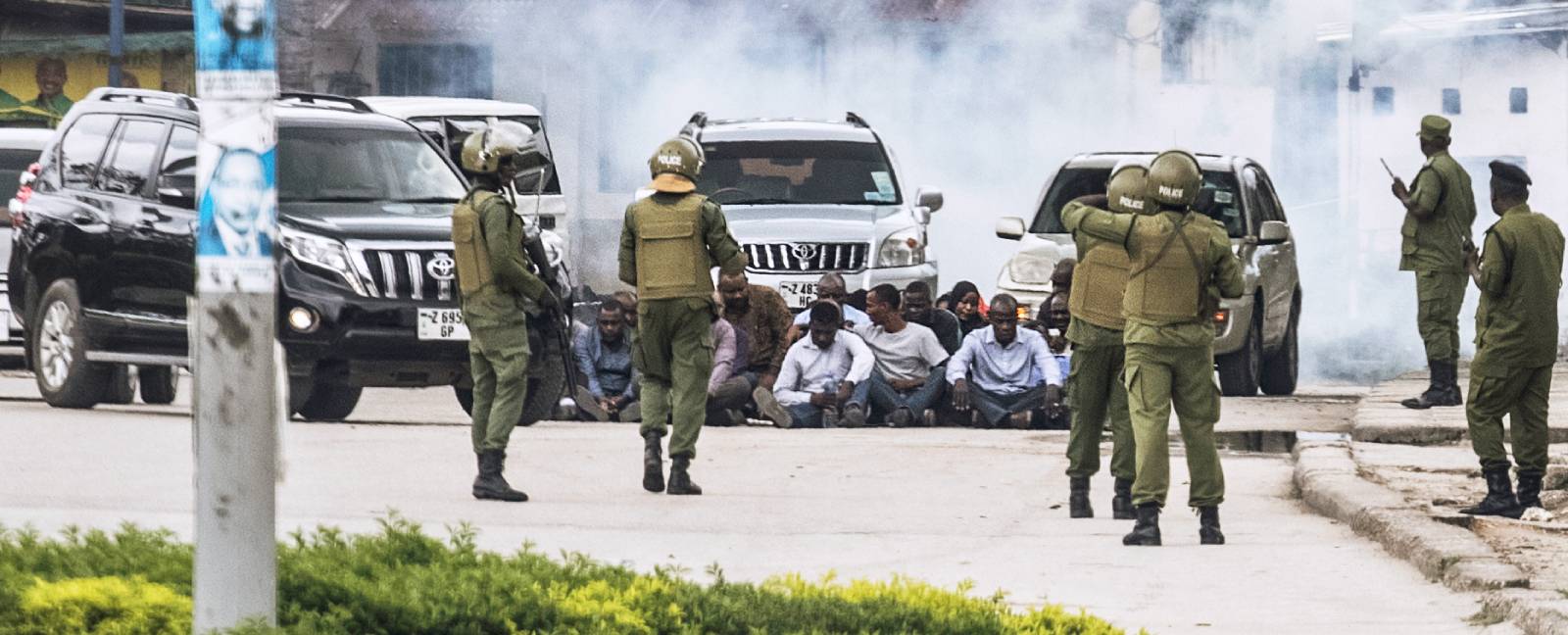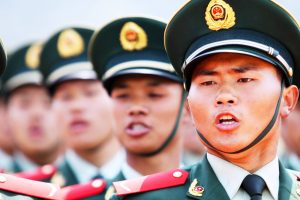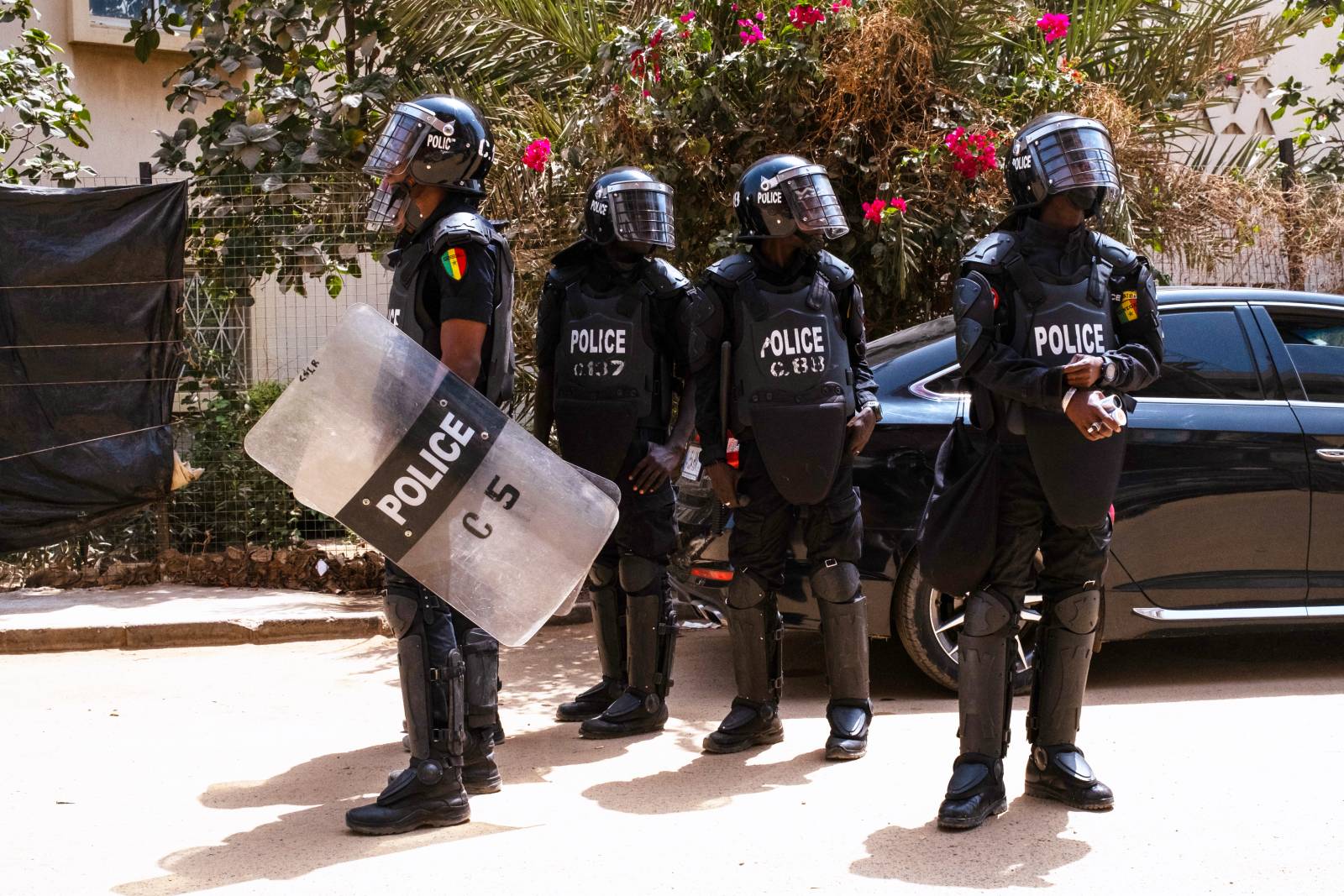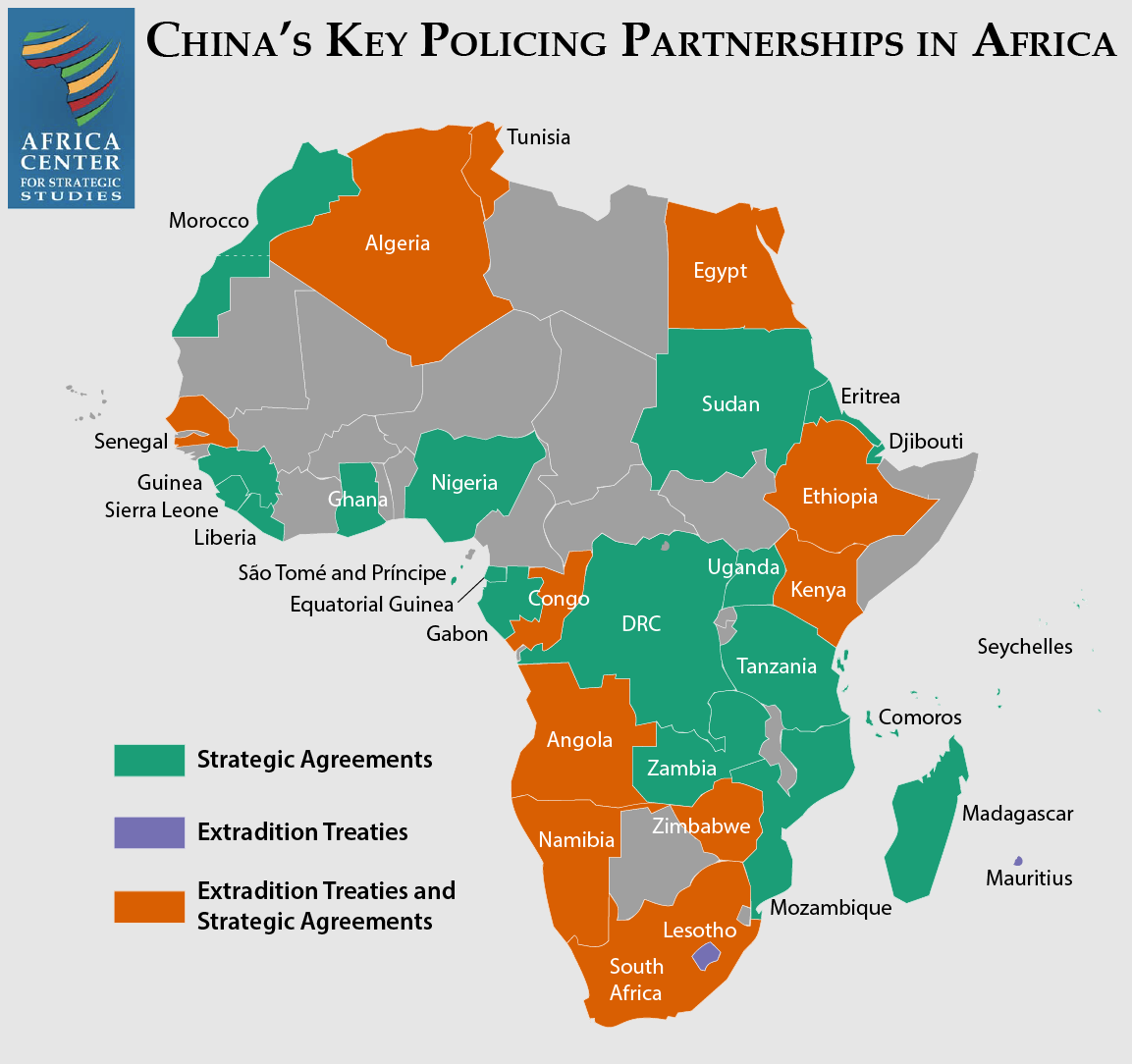English | Français | Portuguese | Swahili | isiZulu | العربية

Anti-riot police in Tanzania detaining a group of men during opposition protests the day after the 2020 presidential election. (Photo: AFP)
Ugandan Special Forces and over 30 Chinese commandos conducted a joint operation in January 2022, leading to the capture and deportation of four Chinese citizens alleged to be part of a criminal ring.
In April 2016, working in close cooperation with the Chinese People’s Armed Police (PAP), 44 Taiwanese nationals were boarded onto a China-bound flight by Kenyan security. Upon arrival in China, they received stiff jail sentences of up to 15 years on fraud-related charges. The Kenyan police took this action even though some of the suspects had previously been acquitted in a Kenyan court.
Chinese intelligence, working alongside their Egyptian counterparts, reportedly interrogated Chinese students in an Egyptian prison in May 2022. They were part of a group of 200 Chinese nationals (mostly Muslims) rounded up by Egyptian security weeks after Egypt’s interior ministry signed a cooperation agreement with China’s Ministry of Public Security (MPS) to “address the spread of terrorism ideologies.” Egyptian human rights organizations have subsequently slammed their government for shirking its international legal obligation to protect Chinese asylum seekers from refoulment. Similar events have occurred in Morocco and other Muslim-majority countries globally.
“Uncritical application of China’s model of absolute party control could undermine military and police professionalism.”
These joint operations are but the most prominent of a wide range of expanding Chinese law enforcement activities in Africa that have largely escaped scrutiny. They also reflect the expanding promotion of Chinese policing norms within African police forces. Between 2018 and 2021, over 2,000 African police and law enforcement personnel received training in China.
In addition to technical skills, MPS training entails political and ideological principles based on the Chinese Communist Party’s (CCP) model of absolute party control of security forces and the state. All police training is organized around this core principle—marking a fundamental difference with African constitutional models and the Pan-African Parliament’s 2019 Model Police Law for Africa, which stress apolitical, professional police organizations that subscribe to parliamentary oversight. African participants represent 35 percent of MPS’s foreign training, second only to Asia.
Chinese norm diffusion in law enforcement includes the training of thousands of African magistrates and lawyers through the Center for African Law and Society at Xiangtan University, the Asian-African Legal Consultative Organization, and the Forum on China-Africa Cooperation (FOCAC)-Legal Forum, which focuses on harmonizing Chinese and African laws among other subjects. The latter has trained over 40,000 African lawyers since 2000.
The prospects for the wider adoption of Chinese norms by some African governments were evident in remarks by Tanzania’s former deputy communications minister at a CCP-sponsored media workshop in 2017 that, “our Chinese friends have managed to block … media in their country and replaced them with their homegrown sites that are safe, constructive, and popular.”

New recruits of the Chinese Peoples Armed Police Force yell out slogans during a military review. (Photo: AFP)
Human rights activists have warned that the uncritical application of China’s model of absolute party control could undermine military and police professionalism and the idea of security for all citizens. The CCP’s security model is summed up in the Party term, “stability maintenance” (weiwen, 维稳), which holds that vigorous regime security is the basis for national security and survival.
The wholesale application of this concept in Africa is problematic, given the resurgence of dominant one-party states and authoritarian practices and the potential to use weiwen as justification for the perpetual retention of power. With weiwen, human rights, civil liberties, and public accountability are secondary. Yet, these values lie at the heart of African commitments to inclusive security. Hence, the weiwen paradigm diverts from African citizens’ aspirations for professional and accountable security services.
Spreading Chinese Law Enforcement Norms in Africa
Unbeknownst to many, China conducts public security and law enforcement operations internationally with greater frequency than does the People’s Liberation Army (PLA). Around 40 African countries have some kind of agreement with Chinese public security agencies. China has also negotiated extradition treaties with 13 African countries, up from zero in 2018.
Such agreements form the basis for the CCP to build support for key MPS goals like repatriating targeted Chinese nationals. Another MPS priority, “overseas Chinese protection” (haiwai gongmin baohu, 海外公民保护), is a politically sensitive issue for many African countries as it entails African security actors giving precedence to protecting Chinese nationals, which creates a perception that their safety is more important than that of African citizens. Nonetheless, this practice is becoming increasingly institutionalized in China’s bilateral security agreements and in each FOCAC Action Plan adopted since 2012.
African governments access Chinese police and law enforcement training through the MPS’s International Law Enforcement Training Program, a collection of 21 police academies. This is roughly equivalent to the number of Chinese military academies open to African students, indicating the scale of police training China conducts.
“Technical disciplines within the Chinese police system are taught within the larger context of China’s political system.”
China has also constructed police training schools, built police stations, and supplied police equipment in many parts of Africa. China’s “no questions asked” policy allows clients to purchase equipment without worrying about human rights-related export controls and end-user monitoring. Between 2003 and 2017, African countries secured $3.56 billion in Chinese loans for public security, including surveillance systems, national security networks, and other security wares like anti-riot gear. This figure is almost certainly an undercount given that the bulk of this equipment is included in military sales.
China’s expanding public security frontlines and tactics in Africa have triggered debates about how much sovereignty African countries surrender by offering Chinese security agencies a highly permissive environment to craft a growing mix of security mechanisms within African countries. In doing so, African partners often show a willingness to break their own laws.
Growing Institutionalization and Scale
African police officers train in the following three types of schools in China:
Provincial Police Academies
- Shandong Police College
- Beijing People’s Police College
- Fujian Police College
- Zhejiang Police College
Higher Academies
- People’s Public Security University of China
- Chinese People’s Armed Police Academy
- Chinese People’s Police University
Specialized Schools
- Police Senior Command College in Beijing
- Special Police College in Beijing
- Railway Police Academy in Shanghai
- China Maritime Police Academy in Zhejiang
- Chinese People’s Armed Forces Academy in Hebei
- Civil Aviation Flight University of China in Sichuan
All schools in MPS’s International Law Enforcement Training Program have ties to specific African countries. Algeria, Lesotho, Mauritius and at least 20 other countries have relationships with the Special Police College, which conducts counter terrorism training. Zhejiang Police College hosts China’s International Police Cooperation Mechanism. Rwanda and the African Union counterterrorism program have ongoing relationships with the Shandong Police College. Fujian Police College launched a training program in South Africa in 2019 for the Johannesburg Metropolitan Police Department with plans for replication in other police metros.
This latter engagement was received with some reservation by the public since a rogue police unit created by the former Minister of Police was sent to the elite Chinese People’s Armed Forces Academy for training in 2016. The unit was then illegally deployed into South Africa’s top security agencies reportedly as a “hit squad,” to intimidate and assassinate political rivals. While it was disbanded by the Ramaphosa administration, the story underlined the dangers of unscrupulous officials collaborating with their Chinese counterparts to create non-statutory forces.
Fujian Police College has also trained the Central African Republic’s presidential guard. The presidential guard is composed almost entirely of President Faustin Touadéra’s kinsmen and has been implicated in a long list of atrocities, including shooting and wounding 10 United Nations peacekeepers in 2021.
“These very forces are often called upon to suppress those at the forefront of political reform, mostly young people.”
The “no questions asked” stance of China’s police engagements is worrisome since providing training to police, presidential guard, and intelligence services known for sectarianism, abuse, and lack of reform incentives may exacerbate the problem. In 2021, for example, Kenya launched a program to send 400 police, paramilitary, and law enforcement personnel to China’s police schools for training annually even though abuse and impunity in the Kenyan police are well documented.
Those pushing for higher standards argue that context matters. This is especially crucial as police, intelligence, and paramilitaries are among the most feared and corrupt institutions in Africa. Hence the debate on the implications of such training will intensify as the scale of Chinese engagements in the public security and law enforcement space increases.
Some of this training has relocated to Africa to reach more trainees and increase the uptake of norms and lessons taught in Chinese schools. A joint program of Algeria’s Ministry of Interior and Local Authorities and the Chinese Academy of Governance (CAG) graduated over 400 Algerian police, law enforcement, and civil service personnel between 2015 and 2018. CAG has trained similar cohorts from South Africa which also has a memorandum of understanding with China’s MPS.
Technical disciplines within the Chinese police system are taught within the larger context of China’s political system. The CCP’s definition of terrorism, for example, derives in part from weiwen. This includes curbing anti-government uprisings and what the CCP calls the “three evils” (san gu shili, 三股势力): terrorism, “splitism” or separatism, and religious extremism. This approach, in turn, informs China’s international counterterrorism partnerships.

A heavy police presence in Dakar, Senegal to prevent any demonstration and any journalist from covering the defamation trial against Ousmane Sonko. (Photo: AFP)
China’s export of security terminologies like “terrorism” and broader norm diffusion is aided by similarities in structure between Chinese and African police. African police entities are centralized under the executive and overseen by an interior, police, or public security minister like in China. Most African police are also part of the national security architecture and tend to be highly militarized in their basic organization, ranking system, and work methods.
Many African police jurisdictions, furthermore, are organized into “commands,” and it is common for police to deploy into the military and vice versa. In practice, African police (as well as intelligence and paramilitaries) often exhibit party and regime loyalties. In China, this is formalized with the police, the Ministry of Public Security (the PAP’s administrative agent), the PLA, and China’s other armed forces all serving as instruments of the CCP.
China has a particularly receptive audience among some African leaders concerned with regime survival. They admire the CCP’s methods of control and its ubiquitous and expansive police-state machinery (jingchaguojia jiqi, 警察国家机器) that dwarfs the PLA’s budget.
Concerns on the Continent
The past decade witnessed a steady growth of independent African scholarly networks on Africa-China relations, including security assistance. This has stimulated more informed debates and policy advocacy aimed at African governments and the AU. This, therefore, may be a critical point of departure between African and Chinese approaches. China’s model of engagement is mostly elite driven, meaning its police and law enforcement work is secretive and rarely debated in the media or by parliamentarians and citizens.
“In China, [party loyalty] is formalized with the police … and other armed forces all serving as instruments of the CCP.”
African human rights groups argue that the training and equipping of security units implicated in human rights violations magnifies negative sentiments toward their benefactors and China should therefore tread carefully. These very forces are often called upon to suppress those at the forefront of political reform, mostly young people. Meanwhile, Africa is the world’s youngest continent with 60 percent of the population below 25 years of age. According to Afrobarometer, half of all respondents across 28 African countries (51 percent) say China’s economic and political influence is positive. While this is a drop from 61 percent in the 2019 survey, it is still significant.
Steady majorities of African citizens also demand democracy: 80 percent reject one-party rule, 75 percent reject authoritarian rule, and 70 percent want to live in a democratic society. These demands rise sharply in the 18–25, 26–35, and 36–45 cohorts, the very population segments China is investing heavily in courting through an array of soft power tools.
Hence there are significant reputational risks to pursuing a policy that does not require recipients of security assistance to be accountable and ethical in employing the training, equipment, and capacity-building they receive.
Looking Over the Horizon
The uptake of CCP norms is not a given. However, the architecture for their diffusion is robust. On its current trajectory, China’s security assistance will continue to trigger fears that it enables unpopular regimes and the security forces keeping them in power. Calls for policy changes will grow louder in light of these fears.
Media, civil society, and independent networks all have roles to play in monitoring external security assistance, creating awareness, and promoting accountability. China has enjoyed broad popularity in Africa over the years, largely because of the economic, educational, and human resource development opportunities it is perceived to bring. Yet, Africans have reservations regarding key CCP norms including absolute party control over politics, security, and the state. These are concerns African governments should be mindful of lest they lose the confidence of those in whose name they govern.
Additional Resources
- Africa Center for Strategic Studies, “Deepening a Culture of Military Professionalism in Africa,” Spotlight, December 20, 2022.
- Jordan Link, “The Expanding International Reach of China’s Police,” Center for American Progress, October 17, 2022.
- Nadège Rolland (ed), “Political Front Lines: China’s Pursuit of Influence in Africa,” NBR Special Report No. 100, National Bureau of Asian Research, June 1, 2022.
- Bulelani Jili, “The Spread of Surveillance Technology in Africa Stirs Security Concerns,” Spotlight, Africa Center for Strategic Studies, December 11, 2020.
- Paul Nantulya, “Chinese Security Contractors in Africa,” Carnegie Tsinghua Center for Global Policy, October 8, 2020.
- Paul Nantulya, “China Promotes Its Party-Army Model in Africa,” Spotlight, Africa Center for Strategic Studies, July 28, 2020.
- Marianne Thamm, “From Death Squad to Dead Squad: Nhleko’s Chinese-Trained ‘Secret Agents’ Left Stranded and Fearful,” Daily Maverick, June 4, 2019.
- Joel Wuthnow, “China’s Other Army: The People’s Armed Police in an Era of Reform,” China Strategic Perspectives 14, Institute for National Strategic Studies, April 16, 2019.
More on: China in Africa Police Sector Reform


